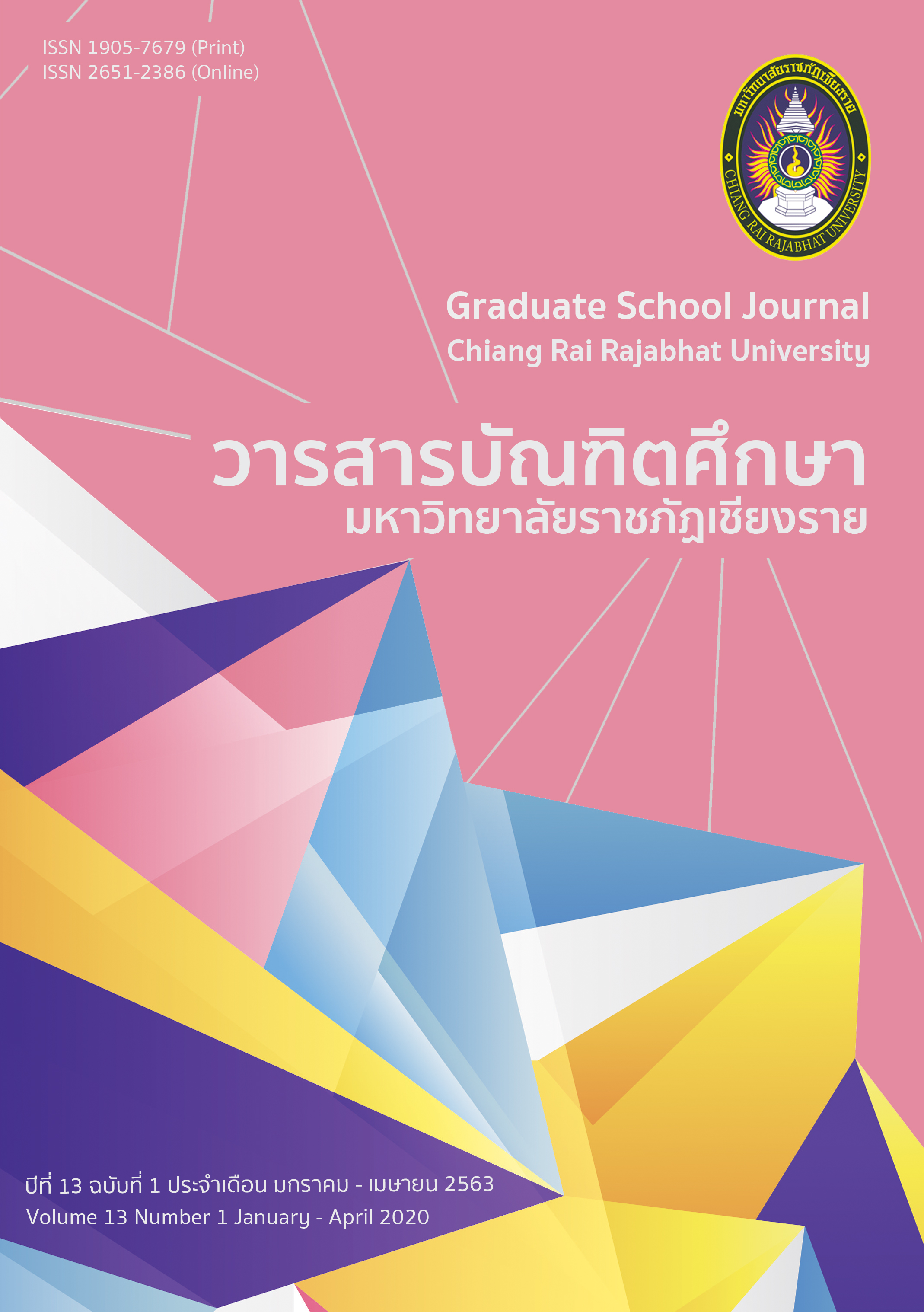การวิเคราะห์องค์ประกอบเชิงยืนยันของรูปแบบการเรียนรู้ของนักเรียนระดับมัธยมศึกษา
Main Article Content
บทคัดย่อ
การวิจัยครั้งนี้มีวัตถุประสงค์เพื่อวิเคราะห์องค์ประกอบเชิงยืนยันของรูปแบบการเรียนรู้ของนักเรียนระดับมัธยมศึกษา และตรวจสอบความสอดคล้องของโมเดลรูปแบบการเรียนของนักเรียนกับข้อมูลเชิงประจักษ์ด้วยโปรแกรมสำเร็จรูป AMOS กลุ่มตัวอย่างที่ใช้ในการวิจัย คือ นักเรียนระดับมัธยมศึกษา โรงเรียนเทศบาล 5 เด่นห้า จังหวัดเชียงราย จำนวน 326 คน การสุ่มตัวอย่างโดยอาศัยความน่าจะเป็น (Probability Sampling) เครื่องมือที่ใช้ในการวิจัยเป็นแบบสอบถามซึ่งพัฒนาจากรูปแบบการเรียนตามแนวคิดของ Grasha and Riechmann มีค่าความเชื่อมั่น 0.83 ผลการวิจัย พบว่า รูปแบบการเรียนรู้ 6 องค์ประกอบ พิจารณาจากค่าน้ำหนักองค์ประกอบที่มีค่าน้ำหนักมากที่สุด ได้แก่ แบบร่วมมือ เท่ากับ 1.75 รองลงมาแบบพึ่งพา มีค่าน้ำหนักเท่ากับ 1.64 แบบมีส่วนร่วม มีค่าน้ำหนักเท่ากับ 1.45 แบบแข่งขัน มีค่าน้ำหนักเท่ากับ 1.22 แบบอิสระ มีค่าน้ำหนักเท่ากับ 1.00 และแบบหลีกเลี่ยง มีค่าน้ำหนักน้อยที่สุดเท่ากับ 0.42 ส่วนโมเดลรูปแบบการเรียนของนักเรียนมีความกลมกลืนสอดคล้องกับข้อมูลเชิงประจักษ์ มีค่า Chi-square = 50.761, p = .365, CMID/DF = 1.058, GFI = .975, RMSEA = .013 ถือได้ว่ามีความสมบูรณ์เป็นที่ยอมรับและน่าเชื่อถือ
Article Details
บทความที่ได้รับการตีพิมพ์เป็นลิขสิทธิ์ของวารสารมหาวิทยาลัยราชภัฎเชียงราย
ข้อความที่ปรากฏในบทความแต่ละเรื่องในวารสารวิชาการเล่มนี้เป็นความคิดเห็นส่วนตัวของผู้เขียนแต่ละท่านไม่เกี่ยวข้องกับมหาวิทยาลัยราชภัฎเชียงราย และคณาจารย์ท่านอื่นๆในมหาวิทยาลัยฯ แต่อย่างใด ความรับผิดชอบองค์ประกอบทั้งหมดของบทความแต่ละเรื่องเป็นของผู้เขียนแต่ละท่าน หากมีความผิดพลาดใดๆ ผู้เขียนแต่ละท่านจะรับผิดชอบบทความของตนเองแต่ผู้เดียว
เอกสารอ้างอิง
ธานินทร์ ศิลป์จารุ. (2560). การวิจัยและวิเคราะห์ข้อมูลทางสถิติด้วย SPSS และ AMOS. กรุงเทพฯ: ห้างหุ้นส่วนสามัญบิสซิเนสอาร์แอนด์ดี.
บริรักษ์ นาให้ผล. (2558). รูปแบบการเรียนรู้ของคนยุคดิจิตอล. สืบค้นเมื่อ 22 ธันวาคม 2561. จาก https://www.hrd.nida.ac.th/hromd2015/UploadFile/datachange/datachange37_2015-09-10.pdf
บุญเตือน วัฒนกุล, ศรีสุดา งามขำ และ กัลยา งามวงษ์วาน. (2559). ความแตกต่างของรูปแบบการเรียนของนักศึกษาพยาบาล. วารสารวิจัยทางวิทยาศาสตร์สุขภาพ, 10(1), 54-61.
ประสาร ศรีพงษ์เพลิด. (2560). สไตล์การเรียนรู้กับสไตล์การสอน. วารสารสำนักหอสมุดมหาวิทยาลัยทักษิณ, 6, 64-86.
วันเพ็ญ ประทุมทอง. (2557). การศึกษาความสัมพันธ์ระหว่างระดับชั้น ผลสัมฤทธิ์ทางการเรียนและบรรยากาศการเรียนรู้กับแบบการเรียนรู้ของนักเรียนระดับชั้นมัธยมศึกษาตอนต้นในเขตกรุงเทพมหานครตามทฤษฎีของคอล์บ. วารสารศึกษาศาสตร์ มหาวิทยาลัยขอนแก่น, 37(3), 126-137.
สำนักงานเลขาธิการสภาการศึกษา. (2560). แผนการศึกษาแห่งชาติ พ.ศ. 2560 – 2579. กรุงเทพฯ: สำนักงานฯ.
สุธิดา ชัยชมชื่น. (2553). การพัฒนาระบบปรับกิจกรรมการเรียนแบบออนไลน์บนพื้นฐานกระบวนการจัดการความรู้สำหรับหลักสูตรผลิตผู้สอนช่างอุตสาหกรรม. (วิทยานิพนธ์ปริญญาปรัชญาดุษฎีบัณฑิต). มหาวิทยาลัยเทคโนโลยีพระจอมเกล้าพระนครเหนือ. กรุงเทพฯ.
สุนทรพจน์ ดำรงพานิช และ อวยพร เรืองตระกูล. (2556). อิทธิพลของสไตล์การเรียน สังกัดของโรงเรียนและขนาดโรงเรียนที่มีต่อผลสัมฤทธิ์ทางการเรียนของนักเรียนชั้นมัธยมศึกษาปีที่ 3 ภาคตะวันออกเฉียงเหนือ. วารสารวิธีวิทยาการวิจัย, 26(1). 21-42.
อาทิตย์ อินต๊ะแก้ว, องอาจ นัยพัฒน์ และ อัญชลี จันทร์เสม. (2560). การศึกษารูปแบบการเรียนรู้ภาษาอังกฤษของนักศึกษามหาวิทยาลัยไทย : การวิจัยแบบผสมผสานวิธีการ. วิทยาการวิจัยและวิทยาการปัญญา, 15(1). 36-53.
Bernarda, J., Chang, T. W., Popescu, E, et al. (2017, June 1). Learning style identifier : Improving the precision of learning style identification through computational intelligence algorithms. Expert Systems with Applications journal, 2017(75), Retrieved https://www.sciencedirect.com/science/article/pii/S0957417417300301
Grasha, A. F. (1996). Teaching with style : A practical guide to enhancing learning by understanding teaching and learning styles. San Bernardino: Alliance Publishers.
Weng, F., Ho, H., Yang, R., et al. (2018, November 28). The influence of learning style on learning attitude with multimedia teaching materials. Eurasia Journal of Mathematics, Science and Technology Education, 15(1), Retrieved https://doi.org/10.29333/ejmste/100389


